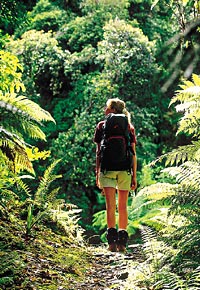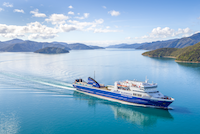Tramping in New Zealand

Walking, or trekking is also known as "tramping" in New Zealand. Tramping in New Zealand will take you into National Parks and reserves, as well as volcanic and coastal regions. You can get as close as possible to nature, including birds and other wildlife. Around 30 percent of New Zealand's land area is officially protected with public access, so there is no shortage of walking opportunities.
Short walks up to a day long are found everywhere, even in city greenbelts, but the well-known multi-day tracks are in the more remote high country. Sparc contains heaps of useful information on easy walks of no more than 1 hour duration.
For overnight walks you can either 'rough it', sleeping out in tents or in more than 1,000 communal huts, or enjoy the relative luxury of a guided walk, with all cooking and accommodation provided. Huts are spaced around four to five hours walk apart and contain bunks, a water supply and often cooking facilities. Fees range from NZ$4 to NZ$14 per night, but more than 350 huts are free of charge.
Most tracks can be walked year-round, although some of the high altitude tracks in the South Island are restricted by winter weather.
You will need to book ahead to walk the Milford or Routeburn tracks between late October and late April each year. Contact the Department of Conservation's (DOC) Great Walks Booking Office by email at greatwalksbooking@doc.govt.nz or fax on +0064-3-2498 515 for further information.
Send a tramping and hiking related E-Postcard to your friends.
New Zealand National Parks
New Zealand has 14 National Parks and conservation areas covering more than one third of the country. These parks are reserved for public use and preservation and offer a range of outdoor activities, including mountaineering, skiing, hiking, walking, fishing, boating, kayaking and swimming. Most of all, however, New Zealand's National Parks offer the chance to enjoy an unspoiled landscape. Our environment is precious, and much of New Zealand's flora and fauna is found nowhere else on earth. Please help us protect it for the future, while you enjoy it now:

- Protect New Zealand's unique plants and animals.
- Camp carefully, leaving no trace of your visit.
- Keep streams and lakes clean - avoid using soap or detergents.
- Take care with fires and observe fire-bans.
- Respect our cultural heritage and learn about its significance.
Safety Tips for Walking and Trekking:
Regardless of how easy or well-trodden a track may seem, tramping presents potential risks that all walkers should be aware of. The following are a few basic rules of safety that can help avoid problems on the track:
- Never go walking alone - you don't have to be climbing a mountain to slip over and break your ankle.
- If you're heading off on an overnight hike or any backcountry walk, register your intentions at the nearest DOC office (and notify them when you return), or tell a friend or hotel-owner where you're going and when you plan to return.
- Stick to the track. Most tracks are well marked and maps and track descriptions are available from DOC offices. A compass - and a knowledge of how to use it - is also useful.
- Sudden weather changes can occur anywhere and at any time. In mountain areas, a sunny day can turn into a freezing white-out within hours. At lower altitudes, a sudden downpour can leave you soaking wet and at risk of hypothermia. Always carry both warm and water-poof gear and seek local advice on weather conditions before heading off.
- The sun in New Zealand is very strong, particularly in summer. It is recommended to cover-up with a hat, shirt and sun-block if you stay in the sun for longer than 15 minutes.
- Dehydration is an issue in any climate. Always carry plenty of water with you. Established tracks often have fresh water sources at camp sites and huts (check in advance) but if you plan to take water from streams, lakes or rivers, you must purify it, preferably by boiling (at least three minutes), or with chemical purifiers or a commercial filter.
- Carry a sufficient amount of food for your tramp, along with a portable cooker if you're staying out overnight. Lightweight, high energy foods are best.
- Hike comfortably - a lightweight backpack and sturdy, worn-in boots are the most important accessories. For overnight walks a quality sleeping bag and (if camping) a tent are also essential.
The Hillary Trust was set up to increase awareness and raise funds for the continuation of Sir Edmund Hillary's work
Send a tramping and hiking related E-Postcard to your friends.
Tourism Activities: Tramping, Hiking and Guided Walks













